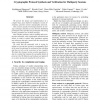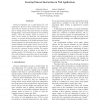137
Voted
CSFW
2009
IEEE
15 years 6 months ago
2009
IEEE
We present the design and implementation of a compiler that, given high-level multiparty session descriptions, generates custom cryptographic protocols. Our sessions specify pre-a...
116
click to vote
CSFW
2009
IEEE
15 years 6 months ago
2009
IEEE
This paper presents a language, based on transaction logic, for specifying dynamic authorisation policies, i.e., rules governing actions that may depend on and update the authoris...
139
click to vote
CSFW
2009
IEEE
15 years 6 months ago
2009
IEEE
Specification documents for real-world authentication protocols typically mandate some aspects of a protocol's behavior but leave other features optional or undefined. In add...
129
click to vote
CSFW
2009
IEEE
15 years 6 months ago
2009
IEEE
ProVerif is one of the most successful tools for cryptographic protocol analysis. However, dealing with algebraic properties of operators such as the exclusive OR (XOR) and Diffie-...
CSFW
2009
IEEE
15 years 6 months ago
2009
IEEE
118
click to vote
CSFW
2009
IEEE
15 years 9 months ago
2009
IEEE
For most basic cryptographic tasks, such as public key encryption, digital signatures, authentication, key exchange, and many other more sophisticated tasks, ideal functionalities...
127
click to vote
CSFW
2009
IEEE
15 years 9 months ago
2009
IEEE
Abstract. We present aspier – the first framework that combines software model checking with a standard protocol security model to analyze authentication and secrecy properties ...
127
click to vote
CSFW
2009
IEEE
15 years 9 months ago
2009
IEEE
We consider using trust information to improve the anonymity provided by onion-routing networks. In particular, we introduce a model of trust in network nodes and use it to design...
155
click to vote
CSFW
2009
IEEE
15 years 9 months ago
2009
IEEE
One of the important challenges when designing and analyzing cryptographic protocols is the enforcement of security properties in the presence of compromised participants. This pa...
134
click to vote
CSFW
2009
IEEE
15 years 9 months ago
2009
IEEE
Timeout mechanisms are a useful feature for web applications. However, these mechanisms need to be used with care because, if used as-is, they are vulnerable to timing attacks. Th...






